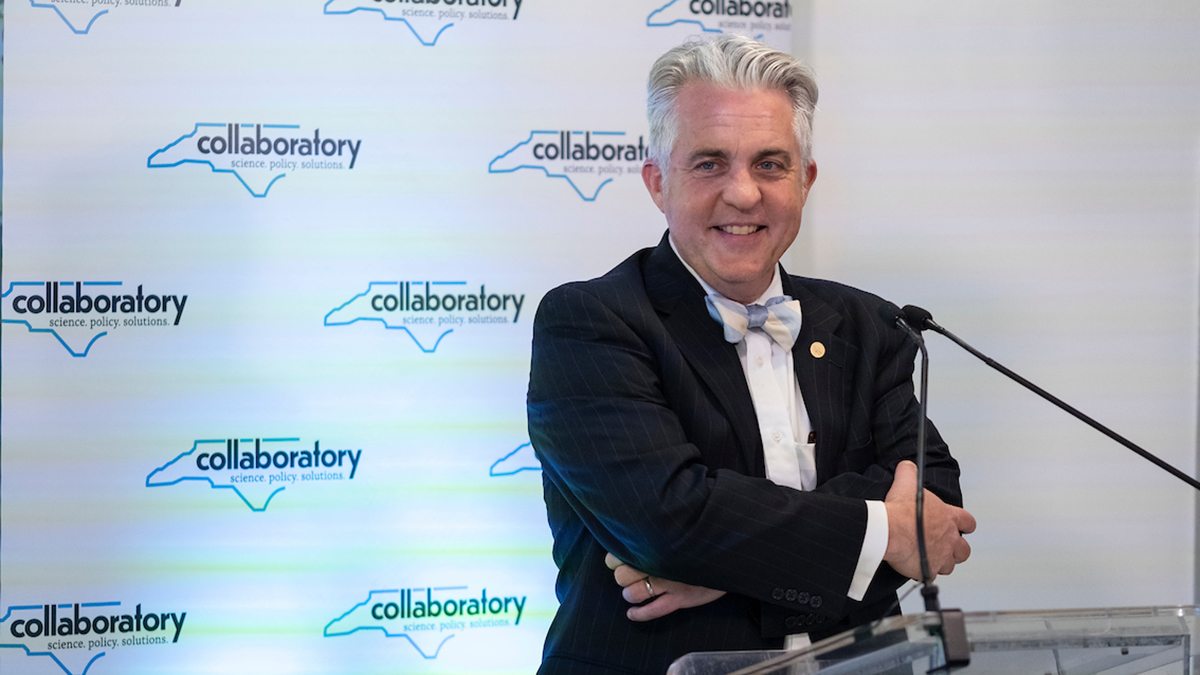Solving some of our state’s most pressing challenges
Researchers at the North Carolina Collaboratory apply their academic research to find innovative, real-world solutions in service to the people of North Carolina.

Proudly the most public of public universities, Carolina is dedicated to serving our state by tackling some of the most pressing issues facing North Carolina communities.
The researchers behind the North Carolina Collaboratory are working to accelerate that mission by applying their academic research to find innovative, real-world solutions in service to the people of North Carolina.
“Our mission is to address pressing environmental, economic and public health issues faced by North Carolinians through academic research that 1) advances knowledge, 2) informs policy and 3) accelerates innovation,” said Jeff Warren, executive director of the NC Collaboratory.
In 2016, the N.C. General Assembly established the Collaboratory to facilitate the dissemination of policy and research expertise of the UNC System and other universities across the state to solve North Carolina’s most pressing challenges through collaboration. The program aims to bridge the gaps between academia, government, industry and community.
Headquartered at Carolina, the Collaboratory conducts both legislatively mandated research, as well as ideas that originate from Collaboratory staff and advisory board members, including landslide mapping in Western North Carolina and the public health impacts of Hurricane Matthew along the coast.
Warren, a marine geologist by training who earned his Ph.D. from Carolina and has spent 15 years in state-level science policy positions, discussed the Collaboratory’s mission of collaboration and ongoing research.
What makes the NC Collaboratory unique?
The Collaboratory has become a funding agency not just within a university campus but inside an entire university system and is the only model of its kind, in terms of scale and scope, within the country. To date, we have funded over 400 individual projects across more than 20 higher education campuses (both public and private) and received almost $150 million in new legislative funding that was not otherwise coming to UNC or the UNC System.
North Carolina is a state of firsts, right? First in freedom. First in flight. And we are headquartered at the nation’s first public university. That’s why it’s worth mentioning our tagline – Science. Policy. Solutions. Why? Because we are first in that, too.
What are some key issues the Collaboratory is working on?
The Collaboratory’s research portfolio is broad reaching and covers pertinent topics that span environment and natural resources, public health, economy and workforce development, and infrastructure and technology. Our project focuses – directed by the legislature – address the state’s most pressing issues.
Currently, some of our largest appropriations are earmarked for research into protecting drinking water through research on per- and polyfluoroalkyl substances, known as forever chemicals; improving educational outcomes for students across the state through new initiatives; fostering economic recovery efforts for regions bouncing back from the pandemic; addressing public health impacts related to COVID-19; providing new infrastructure for small towns to strengthen wastewater treatment; supporting opioid abatement and recovery efforts at the state and local level; and preparing eastern North Carolina for future storm events through resiliency planning and flood mitigation measures.
Why is it important for universities in the UNC System specifically to be working to tackle these problems in our state?
When you are lucky enough to have some of the world’s top universities and top academic researchers in their respective fields, it is a logical approach to deploy them on pressing issues facing our state. These researchers are connected to this place and our communities; they are motivated by these issues and committed to serving North Carolina.
Akin to the DARPA (Defense Advanced Research Projects Agency) model, the Collaboratory can quickly stand up a research team, often spanning multiple campuses, and develop solutions to problems facing North Carolina residents. Through our ability to efficiently steward taxpayer dollars to research and development efforts, policymakers have access to experts, data and often technological solutions, when it is vital.
How does collaboration — across universities in the System and across departments at those universities — make an important impact on what the Collaboratory is trying to achieve?
Collaboration is crucial to the success of the projects funded by the Collaboratory. Partnerships between universities and across disciplines strengthen the impact of the research as we bring together specialists in discrete fields who contribute to the holistic understanding of the issue at hand. This kind of collaboration allows creativity to flourish while academic rigor is upheld and enables the knowledge gained from projects to be applied for the benefit of the state.
The UNC System belongs to every North Carolina resident, so it is appropriate that the research we support is in direct support of making their lives better, safer and healthier. Many of today’s issues are emerging and complicated and require direct engagement with global experts who can provide knowledge, data and recommendations to policymakers. In addition to this inter-institutional collaboration, the Collaboratory also supports partnerships that span industries, connecting academics, the legislature, state agencies, businesses and communities.
What are some of the successes of the Collaboratory that you are most proud of?
Simply having a front porch to the UNC System for legislators, whether we are providing data or access to experts, is a success story in and of itself. Carrying out projects on all 17 campuses of the UNC System and in partnership with all three branches of state government is also an exciting milestone. Further, successfully launching an annual $1.5 million grant program for our System’s six historically minority-serving institutions is critical to building research capacity and partnerships with underserved communities.
However, I believe some of the most exciting stories are centered around the development of technology to address and mitigate issues being faced by North Carolinians for more effective water filtration, treatments for COVID-19 and various cancers, wastewater monitoring for existing and emerging pathogens and opioid addiction. Technology is what makes science tangible. I am proud of the notable impact these projects hold for our state.




